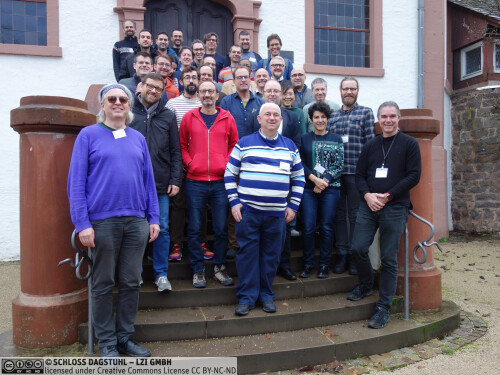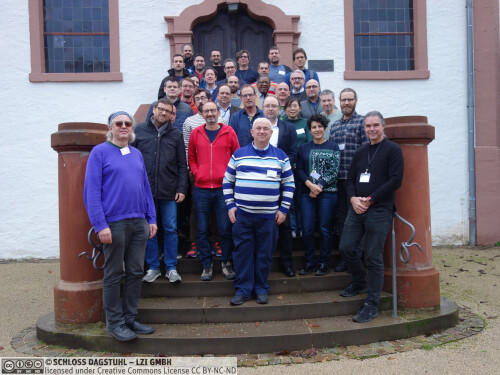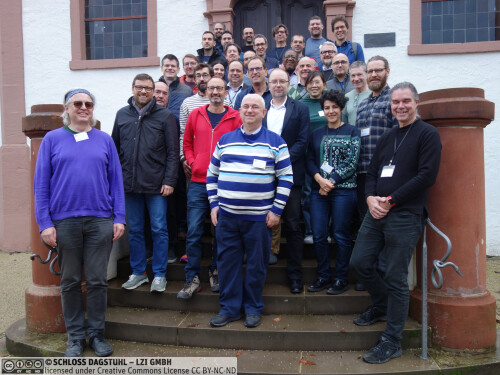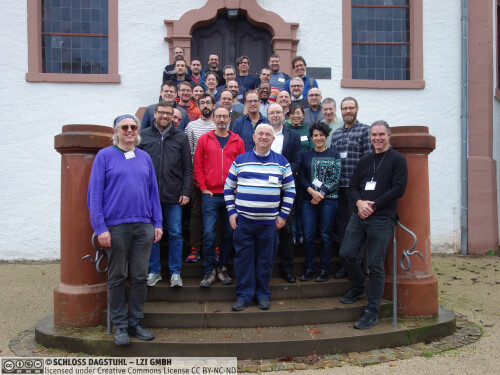Dagstuhl-Seminar 23461
Space and Artificial Intelligence
( 12. Nov – 17. Nov, 2023 )
Permalink
Organisatoren
- Saso Dzeroski (Jozef Stefan Institute - Ljubljana, SI)
- Holger H. Hoos (RWTH Aachen, DE)
- Bertrand Le Saux (ESA - Frascati, IT)
- Leon van der Torre (University of Luxembourg, LU)
Kontakt
- Michael Gerke (für wissenschaftliche Fragen)
- Christina Schwarz (für administrative Fragen)
Scope of the Seminar
Our interdisciplinary seminar on Space and Artificial Intelligence was situated at the intersection of research on AI / computer science and space research. Since each of these is a very wide field on its own, below we give a broad outline of each of the two. We focus on the aspects that were topics of discussion at our Seminar.
Artificial intelligence studies computer systems that behave similarly to humans, in a way that the resulting behaviour would be considered intelligent if exhibited by humans. The field of AI thus focusses on the design and analysis of algorithms and systems that can replicate, support or surpass human perceptual, linguistic, and reasoning processes; learn, draw conclusions, and make predictions based on large or small quantities of data; replicate or enhance human perception; support humans in diagnosis, planning, scheduling, resource allocation, and decision making; and cooperate physically and intellectually with humans and other AI systems (https://claire-ai.org/what-is-ai/). All these topics are relevant for space research.
At a high level, AI can be categorised into three (non-exclusive) categories:
- Data-driven AI
- makes use of data in order to produce intelligent behaviour; it prominently encompasses machine learning, data mining, and pattern recognition approaches and is often referred to simply as machine learning. In this area, methods based on neural networks have been particularly successful and, as a result, become a major focus of attention for the last decade, but many other approaches exist and continue to be used with considerable impact, including support vector machines and random forest models for supervised learning, and various types of clustering methods for unsupervised learning.
- Knowledge-based AI
- is focussed on the explicit formalisation of human knowledge and its use for tasks such as reasoning, planning, and scheduling. Although knowledge-based AI is currently somewhat less prominent than data-driven AI, it has important and impactful uses, e.g., in ensuring the correctness of computer hard- and software, and in solving a broad range of real-world industrial optimisation problems. Many AI experts now believe that combinations of data-driven and knowledge-based methods are likely to provide the basis for next-generation trustworthy AI systems. In this context, explainable AI (XAI), where the results of AI solutions can be understood by humans, is gaining importance.
- Embodied AI
- concerns the design and study of AI systems that interact directly with the physical world. This area is also known as robotics and has very important applications in an increasingly broad range of application sectors, including manufacturing, medicine, and agriculture. Interaction with the physical environment (including other robots and humans) poses unique challenges, e.g., in terms of safety, robustness, and real-time requirements. Most experts in the field of robotics make use of knowledge-based and data-driven approaches, in addition to specialised methods for dealing with the previously mentioned challenges.
Legal and ethical aspects of AI have also started to attract attention recently. The legal part includes laws that regulate the use and development of artificial intelligence. The ethical part is concerned with the moral behavior of humans as they design, make, use, and handle artificially intelligent systems, but also with the moral behavior of machines (machine ethics).
The different forms of AI can be applied to a variety of problems in space-related research, of which here we highlight two major branches:
- Space Operations (SO)
- are concerned with all aspects of operating spacecraft, including the planning, implementing, and operating of all (also ground segment) systems required for reliable and efficient spaceflight missions. This includes all relevant mission operations, ground infrastructure, flight dynamics, mission planning, communications, and data acquisition functions. Large amounts of data about space operations are collected and can be utilized by ML / data-driven AI to address challenges that include autonomous spacecraft route planning, spacecraft anomaly detection, and optimal spacecraft operations.
- Earth Observation (EO)
- is a major instrument for monitoring our planet, its land and ocean processes, and their dynamics. A large number of spacecraft carrying a broad range of instruments generate a wide variety of sensor data (active / passive) of many resolutions: With these data now accessible to researchers and agencies, as well as the general public, a final barrier remains the need to convert the enormous quantities of raw EO data (generated on a daily basis) into valuable information for making decisions and taking concrete actions, e.g., towards achieving the Sustainable Development Goals. Needless to say, the potential for applying AI and ML in this context is almost unlimited.
Many other space-related AI applications can be conceived, typically related to the use of ML for the analysis of data collected during specific space missions. These include, e.g., modeling and forecasting space weather, mapping planet surfaces, galaxy profiling, identifying exoplanets and their environment, as well as analyzing astro-biology data. Several of these belong to astronomy and concern data collected via astronomical observatories in orbit.
Seminar topics
The seminar covered many different aspects of Artificial Intelligence for space and touched upon a wide variety of topics. However, it focussed specifically on the following four topics -- all of which are currently actively researched - structured along two dimensions (AI approaches and Space applications):
- Data-driven AI, e.g., machine learning, for space.
- The first topic of the seminar addressed machine learning methods for the analysis of the ever larger quantities of data resulting from space related research and exploration, their current state-of-the-art, and directions for further development.
- Knowledge-driven AI, e.g., explainable AI, for space.
- The second topic of the seminar was concerned with methods and techniques from knowledge representation and reasoning, and explainable AI, their current state-of-the-art, and directions for further development.
- Space Operations applications of AI.
- The third topic of the seminar concerned various aspects of operating spacecraft and managing missions, the potential applications of AI in this area, and the challenges they pose for Artificial Intelligence methods.
- Earth Observation applications of AI.
- The fourth topic of the seminar concerned various aspects of applying AI to Earth observation data, the vast variety of potential applications of AI in this area, and the challenges they pose for Artificial Intelligence methods.
Note that the topics along the space applications dimension interact strongly with the AI approaches dimension. For example, space operations applications, such as estimating the current and predicting the future states of spacecraft, have a strong temporal dimension requiring the use of data stream mining approaches from AI. On one hand, this poses challenges to address in the development of novel AI methods. On the other hand, this can provide excellent benchmarking opportunities for the evaluation of AI methods.
The above four topics were the focus of the seminar. Given the interests of the participants of the seminar, we also considered a few additional topics (to a lesser extent). These included, for example, legal, ethical, and social aspects of Space AI.
Structure of the seminar
The structure of our seminar was standard for Dagstuhl. We started with an introduction round on Monday morning. The majority of the time was taken by plenary talks and parallel discussions in working groups: There were two of the latter, one on Tuesday morning and one on Friday morning. The social event on Tursday afternoon included a visit to the V\"{o}lklingen Ironworks UNESCO industrial heritage site and a dinner.
- Plenary talks.
- Given the highly interdisciplinary nature of the seminar, participants from one discipline needed to be brought up to speed with the state of the art in the other relevant disciplines. Some of the talks were thus of an overview or tutorial nature. Examples of such talks are ``Introduction to Space Operations'' and ``Introduction to Explainable Artificial Intelligence''. Other talks were more specific, addressing particular AI methods or classes thereof or particular (areas of) AI applications in space research. The plenary talks can be clustered into four different groups
- Plenary talks on machine learning,
- Plenary talks on explainable AI,
- Plenary talks on earth observation, and
- Plenary talks on space operations.
- Parallel discussion in working groups.
- A substantial part of the seminar time was split into structured small-group work sessions. The aim of the structured work sessions was to address the focal topics of the seminar that were most interesting for the participants. The participants could more effectively share knowledge and experiences from their own areas of expertise in the smaller working groups. The highlights of these structured small-group sessions were presented to the seminar as a whole. The parallel discussions in working groups on Tuesday morning addressed the following topics:
- Sustainable development goals and AI for good,
- AutoML and benchmarks,
- On-board and frugal AI, and
- Responsible AI.
The parallel discussions in working groups on Friday morning all addressed the same topic of challenges in AI & space and future research directions.
Outcomes of the seminar
The seminar brought together a diverse set of players. These included researchers from academia, on one hand, and practitioners from space agencies (ESA, NASA) and industry, on the other hand. It covered a broad range of aspects relevant for the further development of the field.
The major outcomes of the seminar are as follows:
- It gave researchers from the different contributing disciplines an integrated overview of current research in the area of artificial intelligence for space.
- It reinforced the communication channels for researchers tackling challenges in space applications using AI, including both data driven and knowledge-driven approaches to AI, such as machine learning and explainable AI, thereby bridging the divide between computer science and space research.
- It defined the landscape of potential applications of artificial intelligence in space, in particular in the areas of Space Operations and Earth Observation.
- It identified the central research questions and challenges for artificial intelligence approaches that need to be resolved for successful use of AI in space applications.
- It put forward some strategies for designing artificial intelligence tools for space applications and for developing benchmarking suites for evaluating such approaches.
 Saso Dzeroski, Holger H. Hoos, Bertrand Le Saux, and Leon van der Torre
Saso Dzeroski, Holger H. Hoos, Bertrand Le Saux, and Leon van der Torre
Monitoring climate change by using satellites measurements, using autonomous rovers to explore other planets, identifying celestial objects using astronomical observatories in orbit: these are just a few tasks where Artificial Intelligence (AI), and especially Machine Learning (ML), are helping space-related research and applications. With the intensification of space exploration, on one hand, and the rapid development of the field of AI, on the other hand, the time is ripe for a Dagstuhl Seminar to discuss current and novel space-related applications of AI, e.g., in Space Operations and Earth Observation, cutting edge and upcoming AI approaches to be used for this purpose, and challenges AI needs to address in this context, that will likely lead to new AI science.
This Dagstuhl Seminar covers topics of AI relevant for space-related applications, focusing on four major topics structured along two dimensions (AI approaches and Space applications):
- Data-driven AI, e.g., ML, for space. This topic addresses ML methods which can be used to analyze the ever larger quantities of data resulting from space related research and exploration, their current state-of-the-art and directions for further development.
- Knowledge-driven AI, e.g., explainable AI, for space. This topic is concerned with methods and techniques from knowledge representation and reasoning, as well as explainable AI, where the results of AI solutions can be understood by humans. It considers the current state-of-the-art in this area and explores directions for further development.
- Space Operations applications of AI. This topic encompasses various aspects of operating spacecraft and managing missions, many potential applications of AI approaches in this area, and the challenges these applications pose for AI methods.
- Earth Observation applications of AI. This topic of the seminar includes different aspects of applying AI to Earth observation data, a variety of potential applications of AI in this area, and the challenges they pose for AI methods.
Based on the interests of the participants of the seminar, we will also consider additional topics, such as legal, ethical and social aspects of Space AI; space robotics; or other AI applications, e.g., in astronomy.
The seminar will include concise tutorials, bringing participants from the different disciplines on the same page. It will also include brief contributed talks by the participants, introducing topics for discussion, further development and interactions. Most of the time will go to discussions and working sessions pursuing the main goals of the seminar outlined below.
With this Dagstuhl Seminar, we hope to: (1) Give researchers across the contributing disciplines an integrated overview of current research in the area of AI for space. (2) Reinforce the communication channel for researchers from different disciplines tackling challenges in space applications using AI, bridging the divide between computer science and space research. (3) Define the landscape of potential applications of AI in space, in particular in the areas of Space Operations and Earth Observation. (4) Identify the central research questions and challenges for AI approaches that need to be resolved for successful use of AI in space applications. (5) Produce a road-map of strategies for designing AI tools for space applications and for developing benchmarking suites for evaluating such tools.
To this end, the seminar will bring together a diverse set of players. This will include researchers from academia, on one hand, and practitioners from space agencies (ESA, NASA, JAXA) and industry, on the other hand. In this way, most relevant aspects for the further development of the field will be covered.
 Saso Dzeroski, Holger H. Hoos, Bertrand Le Saux, and Leon van der Torre
Saso Dzeroski, Holger H. Hoos, Bertrand Le Saux, and Leon van der Torre
- Jonathan Bamber (University of Bristol, GB) [dblp]
- Mitra Baratchi (Leiden University, NL) [dblp]
- Damian Borth (Universität St. Gallen, CH) [dblp]
- Gustau Camps-Valls (University of Valencia, ES) [dblp]
- Nuno Carvalhais (MPI für Biogeochemie - Jena, DE) [dblp]
- Michelangelo Ceci (University of Bari, IT) [dblp]
- Dan Crichton (Jet Propulsion Laboratory - Pasadena, US) [dblp]
- Mihai Datcu (University Politehnica of Bucharest, RO) [dblp]
- Alessandro Donati (Brombachtal, DE) [dblp]
- Saso Dzeroski (Jozef Stefan Institute - Ljubljana, SI) [dblp]
- Simone Fratini (Solenix Engineering GmbH - Darmstadt, DE)
- Holger H. Hoos (RWTH Aachen, DE) [dblp]
- Dino Ienco (INRAE - Montpellier, FR) [dblp]
- Dario Izzo (ESA / ESTEC - Noordwijk, NL) [dblp]
- Žiga Kokalj (ZRC SAZU - Ljubljana, SI) [dblp]
- Ana Kostovska (Jozef Stefan Institute - Ljubljana, SI) [dblp]
- Bertrand Le Saux (ESA - Frascati, IT) [dblp]
- Jurica Levatic (Jozef Stefan Institute - Ljubljana, SI) [dblp]
- Sylvain Lobry (Paris Cité University, FR) [dblp]
- George Anthony Long (Legal Parallax - Fountain Hills, US)
- Luke Lucas (LSE Space - Darmstadt, DE) [dblp]
- Jose Martinez Heras (Solenix - Darmstadt, DE) [dblp]
- Yazan Mualla (University of Technology of Belfort-Montbéliard, FR) [dblp]
- Jakub Nalepa (Silesian University of Technology - Gliwice, PL) [dblp]
- Evridiki Ntagiou (ESA / ESOC - Darmstadt, DE) [dblp]
- Pance Panov (Jozef Stefan Institute - Ljubljana, SI) [dblp]
- Claudio Persello (University of Twente, NL) [dblp]
- Gauthier Picard (ONERA/DTIS, Université de Toulouse, FR) [dblp]
- Markus Reichstein (MPI für Biogeochemie - Jena, DE) [dblp]
- Jakob Runge (DLR - Jena, DE & TU Berlin, DE) [dblp]
- Marjan Stoimchev (Jozef Stefan Institute - Ljubljana, SI) [dblp]
- Alexandru Tantar (Luxembourg Inst. of Science & Technology, LU) [dblp]
- Leon van der Torre (University of Luxembourg, LU) [dblp]
- Jan van Rijn (Leiden University, NL) [dblp]
- Joaquin Vanschoren (TU Eindhoven, NL) [dblp]
- Xiaoxiang Zhu (TU München, DE) [dblp]
Klassifikation
- Artificial Intelligence
- Machine Learning
Schlagworte
- artificial intelligence
- space
- machine learning
- space operations
- earth observation





 Creative Commons BY 4.0
Creative Commons BY 4.0
